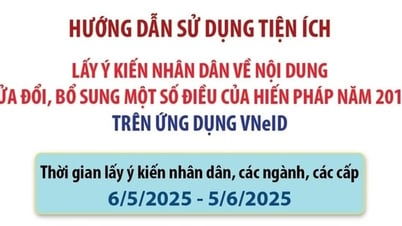"AI cannot replace human responsibility"
Ms. Le Phuong Ha, Deputy Director of the Institute of Digital Transformation Strategy, said that digital transformation is an inevitable trend worldwide as well as in Vietnam. Therefore, on December 22, 2024, the Politburo issued Resolution 57 on breakthroughs in science and technology development, innovation and national digital transformation.
“The story of digital capacity is being talked about a lot. If we do not cultivate digital capacity ourselves to be able to master all thoughts and actions in the digital space, it will be difficult to become a part of the country's development history. The Ministry of Education and Training (MOET) has issued Circular 02 regulating the digital capacity framework for learners. Educational institutions are currently making efforts to improve digital skills for students, so that they have the opportunity to access new knowledge, thereby forming digital capacity for themselves,” said Ms. Le Phuong Ha.

Associate Professor Dr. Ha Minh Hoang, Head of the Department of Data Science and Artificial Intelligence (School of Technology - National Economics University) said that digital skills and digital capacity are not just auxiliary capacities, but are survival skills, helping the young generation develop and not be left behind.
For example, in terms of daily interactions, today's young generation can sit in one place, but communicate with the whole world through Google Meet or other online platforms. Young people can also express themselves through social networks such as Facebook, Instagram and almost everyone has a digital version of themselves.
In the field of study, many students are also interested in applying digital technology to study and research. It can be seen that the digital age creates many opportunities for young people to have the opportunity to study and develop themselves better. Young people in Vietnam can absolutely study with the world's leading professors through platforms such as Coursera or EDX...
In job searching, instead of having to submit hard copies of documents, then PDF files like before, the younger generation can now send employers online CVs, personal websites... In terms of startups, Associate Professor Dr. Ha Minh Hoang gave an example in the field of information technology (IT), to create a software product, previously it took 10 engineers, now with the support of AI it only takes 2 people.
As a result, many workers are worried about being laid off and replaced by artificial intelligence. Those who are skeptical about AI or have not used AI should also learn and learn how to take advantage of the power of AI.
"However, recently, there are young people who are relying heavily on AI, not being proactive or creative, which is quite dangerous. It is necessary to understand the nature and limitations of AI. AI cannot replace human responsibility, still has errors, limitations in calculation, sometimes fundamental errors. Therefore, the young generation needs to learn how to accompany, master, and turn AI into an assistant to serve work and life more effectively," Associate Professor, Dr. Ha Minh Hoang emphasized.
In addition, the Head of the Department of Data Science and Artificial Intelligence also believes that special attention should be paid to AI ethics. This is a widely debated issue in the world, and is being pursued by those working on AI. In the context of strong AI development as it is today, students need to be ready to seize opportunities, learn how to use AI effectively, ethically, and best serve their work, and avoid following the beaten path...
Priority in recruiting skilled workers
Mr. Dang Van Huan, Deputy Director of the Department of Higher Education (Ministry of Education and Training), said that after graduation, students are "hunted" by businesses with high salaries depending largely on their digital skills, thinking and ability to work in groups.

The Ministry of Education and Training has issued Circular No. 02 regulating the digital competency framework for learners with 6 competency domains and 24 digital skills. In particular, it emphasizes AI application skills. The Ministry of Education and Training as well as universities are also interested in integrating digital skills into regular and supplementary training programs, so that students are ready to participate in an increasingly fierce labor market.
Besides, when doing any job, you need to think of a different way of doing it, avoid following the beaten path, find new paths, new methods and always question what is going on.
According to Ms. Nguyen Bich Van, Head of Human Resources Department of Navigos Group, the 4.0 industrial revolution and the explosion of artificial intelligence have fundamentally changed the way of living and working as well as greatly affected employment trends. In addition to changes in current jobs, the labor market has also seen the emergence of many new jobs, new ways of working, and new ways of managing and operating businesses.
According to a recent survey by Navigos with more than 500 businesses, up to 50% of businesses are currently focusing on recruiting personnel in the business and sales sector, especially those with 2-3 years of experience, because this is the force that directly generates revenue, expands customers, and expands the market. Next are industries related to information technology and software, a field of work that tends to transform digitally to increase competitive advantage.
The third industry group accounts for about 10% of recruitment needs related to digital marketing and communications. The reason for the high demand for this industry group is because businesses focus on reaching customers through digital channels, promoting business brands.
Regarding the expectations of employers for candidates, according to Ms. Nguyen Bich Van, if in the past employers valued hard skills to meet the actual needs of the job, now soft skills are an important criterion. Some core soft skills that businesses are looking for, helping candidates in the business to quickly adapt to changes, create value quickly or have the ability to solve problems are self-improvement and self-upgrading skills.
In addition, foreign language proficiency is also required in the current context. Foreign languages help workers easily integrate into multicultural business models. Next is creative thinking. Artificial intelligence has helped people change, can replace some stages in the work process, however, creative thinking and problem solving are still extremely core factors that give each worker different competitive advantages, thereby creating differences in each product and service of the business.
To increase employment opportunities, Ms. Nguyen Bich Van said that currently, businesses do not use the word "recruitment", but switch to "attracting talent", "attracting talent", because young people have good skills, knowledge and many different job opportunities. The first important thing is the attitude of learning, aiming for self-study. In addition, employers are also paying great attention to the early preparation of candidates, young people should not just focus on higher education, and only start looking for a job after completing it. Currently, there are many types of jobs such as part-time, remote work... young people can do to accumulate experience. Also from those experiences, each person will realize which careers are suitable for their strengths, desires, and orientations.
Source: https://baolaocai.vn/tang-co-hoi-tim-viec-voi-gioi-tre-khi-co-ky-nang-su-dung-tri-tue-nhan-tao-post401846.html


![[Photo] Prime Minister Pham Minh Chinh and Prime Minister of the Kingdom of Thailand Paetongtarn Shinawatra attend the Vietnam-Thailand Business Forum 2025](https://vphoto.vietnam.vn/thumb/1200x675/vietnam/resource/IMAGE/2025/5/16/1cdfce54d25c48a68ae6fb9204f2171a)
























![[Photo] President Luong Cuong receives Prime Minister of the Kingdom of Thailand Paetongtarn Shinawatra](https://vphoto.vietnam.vn/thumb/1200x675/vietnam/resource/IMAGE/2025/5/16/52c73b27198a4e12bd6a903d1c218846)






























































Comment (0)